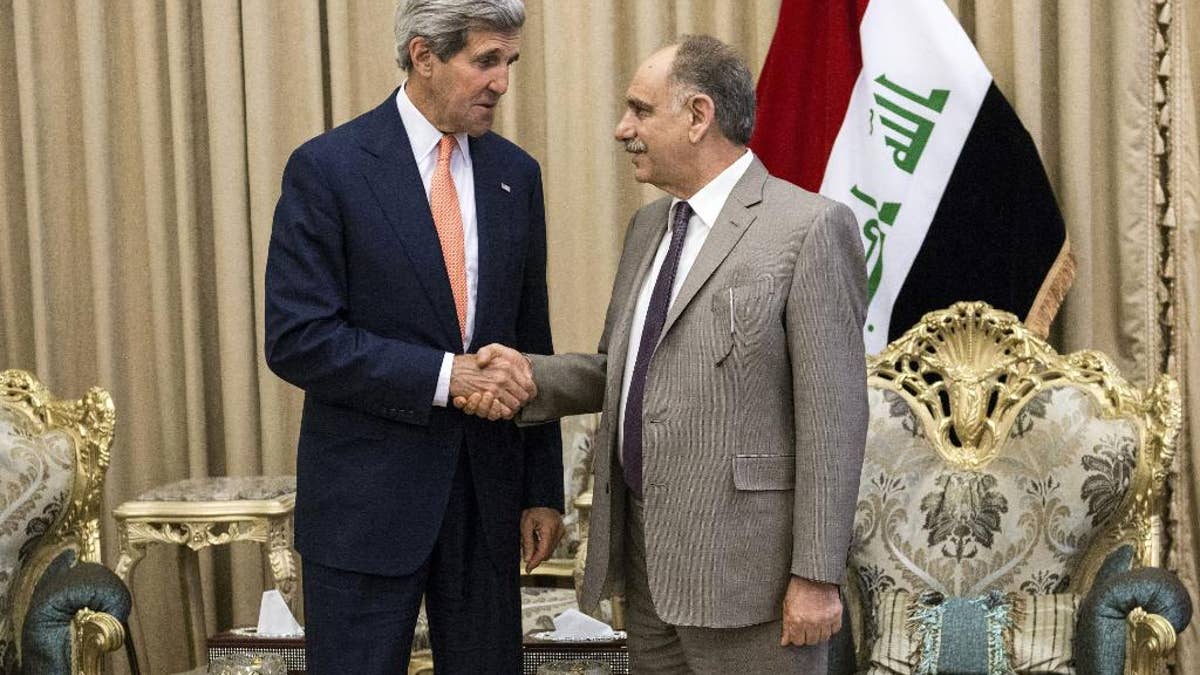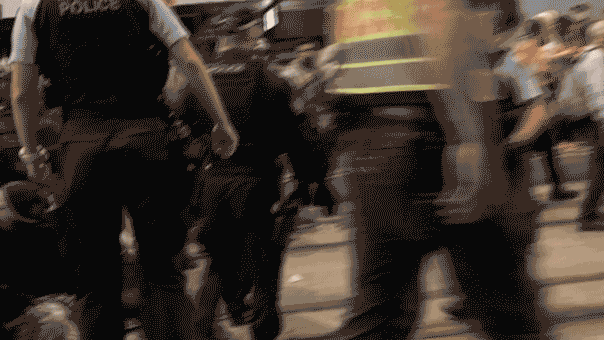
Iraqi Deputy Prime Minister Saleh al-Mutlaq, right, greets U.S. Secretary of State John Kerry before a meeting in the capital Baghdad, Iraq, Monday, June 23, 2014. Kerry said the fate of Iraq may be decided over the next week and is largely dependent on whether its leaders meet a deadline for starting to build a new government. (AP Photo/Brendan Smialowski, Pool) (The Associated Press)
BAGHDAD – The U.S. stepped up efforts to persuade Iraqi officials to stick to their official timetable of seating a new government soon in hopes that it can foster national reconciliation where previous efforts have failed in order to stem the rapidly expanding Sunni insurgency led by an al-Qaida breakaway group, the Islamic State of Iraq and the Levant.
Here's a look at how events unfolded Monday:
US DIPLOMATIC PUSH
Secretary of State John Kerry travels to Baghdad to meet with all of Iraq's squabbling factions. He says they must keep their commitment to seat a new parliament as planned by July 1 before a Sunni insurgency sweeps away hopes for a lasting peace. The lawmakers must elect a speaker, then will have 30 days to elect a president, who will have 15 days to ask the leader of the majority in the 328-seat legislature to form a government. The prime minister-designate has 30 days to form a government. If he fails, the president has 15 days to name a prime minister-designate. Nouri al-Maliki's coalition, State of the law, won the most seats of any single group in the April 30 election. While that would have normally placed him in a strong position to lead a coalition government, consensus is growing among his former Shiites, Kurdish and Sunni allies to deny him a third, four-year term in office. Kerry is seeking to hold the officials to a government transition that the U.S. believes will stave off the threat of a new civil war by giving more power to Iraq's minorities.
THE OIL EFFECT
Iraq's ambitious plans to boost oil production — its most vital economic lifeline — have been jeopardized by the Sunni militant advance. Northern oil fields have been shut down and companies have begun evacuating workers elsewhere in the country due to fears of violence. Iraq's Kurdish minority also has moved to solidify control over the northern city of Kirkuk and other disputed areas outside its semiauonomous territory, weakening Baghdad's claims to the energy riches buried beneath. The heart of Iraq's oil industry is in the mainly Shiite south, which so far has been spared the insurgent threat. Current events in Iraq — the second-largest OPEC crude exporter — already have impacted oil markets. On Monday, the price of crude oil hovered near a nine-month high, with Brent crude, used to price international oil, having jumped 63 cents to $115.44 a barrel in London, close to last Thursday's $115.71, its highest level since Sept. 9 last year.
WORRIED NEIGHBORS
The Sunni insurgents' seizure of territory in Iraq and Syria has sent tremors across the Middle East as neighboring countries worry the Islamic extremists may target them next. The Jordanian army dispatched reinforcements to its border with Iraq last week to boost security, while in Lebanon heavily armed police busted a purported sleeper cell allegedly linked to the group, known as the Islamic State of Iraq and the Levant, in raids on two hotels in central Beirut. Syrian Information Minister Omran al-Zoubi warns in an interview with The Associated Press on Monday that the dramatic events in Iraq threaten to implode "the entire Middle East" and undermine security in Europe and beyond.
BAGHDAD FEARS
Baghdad, a city of some 7 million people, is bracing for more violence as the conflict assumes an increasingly sectarian tone, with Shiite militias preparing for battle against the Sunni insurgents. The Iraqi capital is not under any immediate threat of falling to the Sunni militants who have captured a wide swath of the country's north and west, but fears are rising. Traffic is nowhere near its normal congestion. Many stores are shuttered and those that are open are doing little business in a city where streets empty hours before a 10 p.m. curfew kicks in. Arriving international and domestic flights are half empty, while outgoing flights to the relatively safe Kurdish cities of Irbil and Suleimaniya are booked solid through late July as those who can flee.
VIOLENCE CONTINUES
Gunmen ambush a police convoy transferring prisoners about 85 miles (140 kilometers) south of Baghdad, killing nine policemen and 13 prisoners, according to police officials. The officials said some of the prisoners had been convicted of terrorism-related charges and were being taken to a high-security prison in the southern city of Nasiriyah. The officials spoke on condition of anonymity because they were not authorized to speak to the media. The Sunni militants' stunning battlefield successes in the north and the west of Iraq have laid bare the inadequacies of the country's U.S.-trained forces. In the north, troops fled in the face of advancing militants, abandoning their weapons, vehicles and other equipment. In some cases in the west, they pulled out either when the militants approached or when they heard of other towns falling.








































